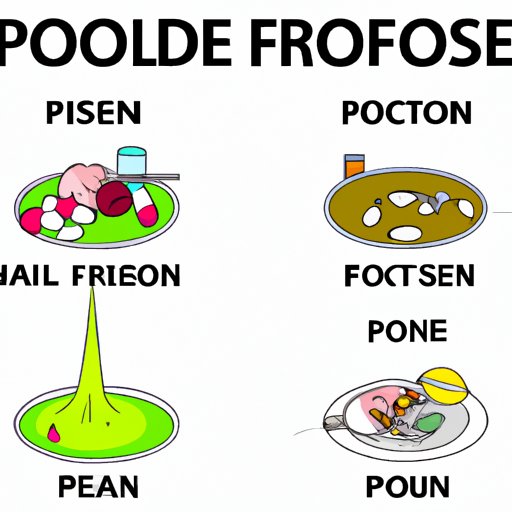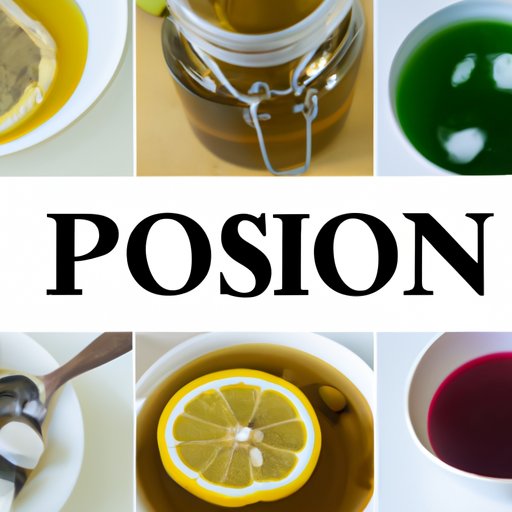I. Introduction
Food poisoning is a common occurrence that can be caused by ingesting contaminated food and drinks. It can cause a wide range of symptoms, such as nausea, vomiting, and diarrhea. Knowing how to manage these symptoms is crucial to avoid dehydration and other complications. In this article, we will discuss some of the top ways to help manage food poisoning symptoms and speed up the recovery process.
II. Top 7 Foods to Eat During Food Poisoning
When dealing with food poisoning, it’s important to consume foods that are easy to digest and will not worsen the symptoms. Here are some of the top foods to eat when recovering from food poisoning:
A. Probiotic-rich foods
Probiotics are beneficial bacteria that promote gut health and digestion. Eating foods rich in probiotics, such as yogurt or kefir, can help replenish the gut with good bacteria and aid in the recovery process.
B. Ginger
Ginger has anti-inflammatory and anti-nausea properties that can help ease stomach discomfort and vomiting. Consuming ginger tea or adding fresh ginger to your meals can help alleviate food poisoning symptoms.
C. Bland carbohydrates like rice and toast
Plain foods like rice, toast, and crackers are easy to digest and can provide much-needed energy and nutrients when dealing with food poisoning symptoms.
D. Other suggested foods for recovery
Consuming clear broths, soups, and bananas can help maintain electrolytes and hydration when dealing with food poisoning. It’s important to avoid foods that are too spicy, greasy, or heavy as they may trigger more symptoms.
III. Natural Home Remedies for Food Poisoning
Along with certain foods, natural remedies can ease food poisoning symptoms and support the immune system. Here are some suggested remedies to try:
A. Drinking clear liquids
Clear liquids, such as water, herbal tea, and coconut water, can help flush out toxins and prevent dehydration during food poisoning. Sipping on clear liquids throughout the day can help prevent nausea and aid in recovery.
B. Taking activated charcoal
Activated charcoal is known for its detoxifying properties and can help absorb toxins and impurities when consumed. It’s important to follow dosage instructions and avoid taking activated charcoal with other medications as it may interfere with absorption.
C. Using essential oils
Essential oils like peppermint, lavender, and chamomile can help soothe stomach discomfort and ease nausea. Adding a few drops to a diffuser or rubbing diluted oil on the stomach can promote relaxation and relieve symptoms.
D. Other suggested natural remedies for symptom relief
Drinking ginger tea, consuming peppermint capsules, and taking probiotic supplements can also help ease food poisoning symptoms and support gut health.

IV. The Worst Foods to Eat When Suffering from Food Poisoning
Certain foods can aggravate food poisoning symptoms and make recovery more difficult. Here are some of the worst foods to avoid when dealing with food poisoning:
A. Oily and fried foods
Foods that are high in fat, such as fried or greasy foods, can be hard to digest and can worsen nausea and vomiting.
B. Spicy foods
Spicy foods can irritate the stomach lining and cause more discomfort when dealing with food poisoning symptoms.
C. High-fiber foods
Foods that are high in fiber, such as raw vegetables and fruits, can worsen diarrhea symptoms and cause more dehydration.
D. Other foods to avoid
Dairy products, caffeine, alcohol, and sugary drinks can also worsen food poisoning symptoms and should be avoided until the symptoms subside.
V. Hydration for Food Poisoning
Staying hydrated is essential when recovering from food poisoning. Here are some suggestions for staying hydrated:
A. Importance of staying hydrated during food poisoning
When experiencing vomiting and diarrhea, the body can lose fluids and electrolytes quickly, leading to dehydration and other complications. Staying hydrated can help prevent these complications and support recovery.
B. Suggested hydration methods
Drinking water, coconut water, or electrolyte-enhanced beverages can help replenish lost fluids and restore electrolytes when dealing with food poisoning.
C. Electrolyte-enhanced beverages
Brands like Pedialyte or Gatorade contain essential electrolytes like sodium and potassium, which can prevent dehydration and support the recovery process.
D. Coconut water
Coconut water is a natural source of electrolytes and has anti-inflammatory properties that can aid in symptom relief.
E. Other suggested hydration methods
Consuming clear broths, drinking peppermint tea, and eating fruits like watermelon and oranges can also help restore hydration and electrolyte balance.
VI. When to Seek Medical Attention for Food Poisoning
While most cases of food poisoning can be managed at home, in some cases, medical attention may be necessary. Here are some signs that indicate medical attention may be necessary:
A. Explanation of when to seek medical attention for food poisoning
When experiencing severe symptoms like high fever, bloody diarrhea, or dehydration, seeking medical attention is crucial to avoid complications and get proper treatment.
B. Symptoms that may require medical attention
Severe dehydration, severe abdominal pain, and persistent vomiting or diarrhea can indicate a more serious case of food poisoning and may require medical attention.
C. Suggested treatments for severe cases of food poisoning
In severe cases, intravenous (IV) fluids and antibiotics may be necessary to treat food poisoning and prevent complications.
D. Other considerations when seeking medical attention
It’s important to inform the doctor of any recent travel or consumption of undercooked or contaminated food to help with proper diagnosis and treatment.
VII. Foods to Avoid to Prevent Food Poisoning
Preventing food poisoning is crucial to avoiding the unpleasant symptoms and potential complications. Here are some tips to prevent food poisoning:
A. Explanation of how to prevent food poisoning
Proper food handling, storage, and preparation are essential to prevent food poisoning. Avoiding certain foods and following food safety tips can also lower the risk of food poisoning.
B. Suggested tips for food safety
Washing hands thoroughly before cooking, cooking meats to the proper temperature, and avoiding raw or undercooked meats and seafood can help prevent food poisoning.
C. Avoiding raw or undercooked meat
Raw or undercooked meat can harbor harmful bacteria, such as E.coli and salmonella, which can cause food poisoning. Cooking meat to the appropriate temperature can kill these bacteria and lower the risk of food poisoning.
D. Washing hands thoroughly before cooking
Washing hands with warm soapy water for at least 20 seconds before cooking or handling food can prevent the spread of harmful bacteria and lower the risk of food poisoning.
E. Other food safety tips
Avoiding cross-contamination by separating raw meats from other foods, refrigerating perishable foods promptly, and checking expiration dates on food products can also lower the risk of food poisoning.
VIII. The Importance of Rest During Food Poisoning
Rest and relaxation are essential to support the immune system and aid in the recovery process during food poisoning. Here are some activities to promote rest and relaxation:
A. Explanation of why rest is crucial during recovery
The body needs rest to focus on healing and repairing itself during the recovery process. Restful activities can also help reduce stress and promote relaxation, which can aid in symptom relief.
B. Suggestions for restful activities
Drinking warm herbal teas, taking a warm bath, and using heating pads can help promote relaxation and ease symptoms of food poisoning.
C. Herbal teas
Herbal teas like chamomile, peppermint, and ginger can help relax the body and ease nausea and stomach discomfort.
D. Warm baths
Taking a warm bath or using a heating pad can soothe muscle aches and cramps caused by food poisoning.
E. Heating pads
Using a heating pad on the stomach or lower back can help provide relief from abdominal cramping and discomfort.
IX. Conclusion
Food poisoning is a common occurrence that can cause unpleasant symptoms and complications. By knowing how to manage these symptoms and taking precautions to prevent food poisoning, individuals can avoid the unpleasantness of food poisoning. By following the tips and remedies discussed in this article, individuals can promote a quicker recovery and support the immune system for optimal health.
A. Recap of the topics covered
In this article, we discussed the top foods to eat and avoid during food poisoning, natural home remedies, hydration methods, when to seek medical attention, prevention tips, restful activities, and more.
B. Importance of taking precautions to prevent food poisoning
Preventing food poisoning is crucial to avoid unwanted symptoms and potential complications. Proper food handling, cooking, and storage, as well as avoiding certain foods, can lower the risk of food poisoning.
C. Final thoughts and suggestions for readers
When dealing with food poisoning, it’s important to stay hydrated, rest, and consume easy-to-digest foods. If symptoms persist or worsen, seeking medical attention is crucial to prevent complications. By following the tips and remedies discussed in this article, individuals can support the recovery process and prevent future instances of food poisoning.
